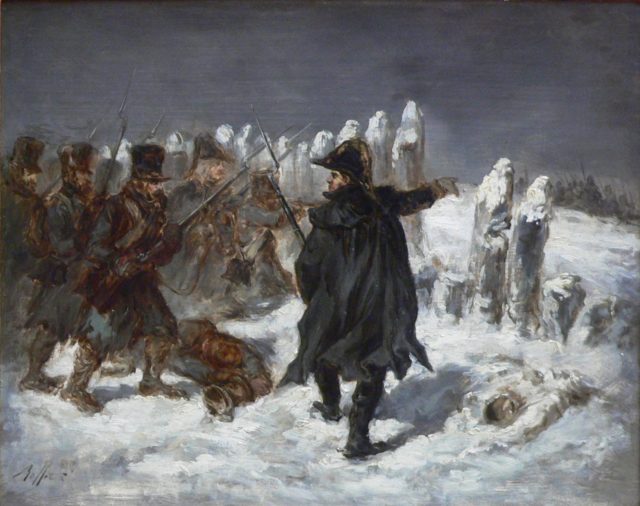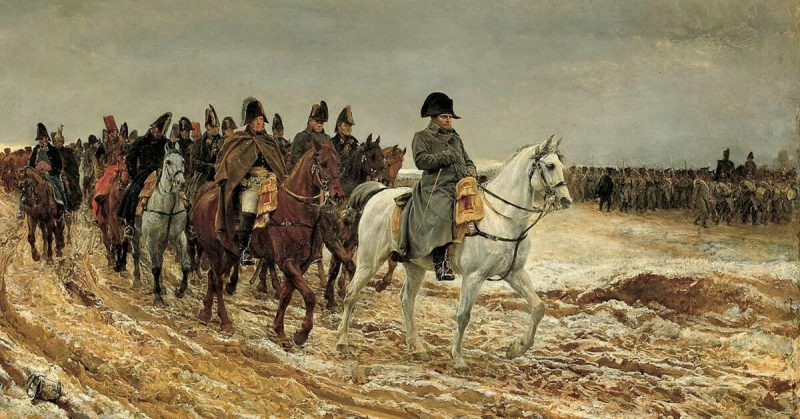Napoleon’s invasion of Russia in 1812 is remembered as one of the great disasters of his reign. Despite tactical successes on the battlefield, he was soundly beaten strategically.
The Russians withdrew, scorching the ground behind them. The French were left without supplies or shelter as a harsh winter closed in. Pursued by the Russians, they retreated with enormous losses.
Meanwhile, the British, Portuguese and Spanish continued to push back French forces in the Iberian Peninsula, the other front on which Napoleon could have deployed his troops.
Napoleon had reasons for going to war with Russia. Within the logic of his strategy for domination of Europe, the campaign became all but inevitable.
No Russian Marriage
Peace between Russia and France had its advantages. It allowed the two great states to carve up much of Europe between them and focus on other opponents. However, to the French, the alliance with Russia was disappointing. The Russians seldom gave the French Emperor what he wanted.
One of the most powerfully symbolic issues, if the least strategically significant, was finding Napoleon, a wife. His first marriage to Josephine had not led to children. The Emperor had no heir, and so the couple agreed to divorce so he could remarry and ensure the Napoleonic line.
This was a chance for a diplomatic marriage that could consolidate French power and the royal legitimacy of Napoleon’s children. However, when he suggested to the Russians one of their princesses might become his bride, he received a frosty reception. It was a setback to his plans and a sign Russia was not committed to their partnership in the long term.
The Continental Blockade
More importantly was Russia’s attitude to the continental system, Napoleon’s plan to boost the French economy and bring Britain to its knees.
The system was intended to be a massive blockade preventing Britain from exporting goods to continental Europe. All shipping were supposed to be involved in the embargo. Through it, Napoleon hoped to ruin the British economy, trigger hyper-inflation, and deprive them of the funds their military required.
To work, this needed all Europe to cooperate. Conquered and allied states obeyed Napoleon’s command. Smaller neighbors could be encouraged through the threat of French aggression. Russia, however, was too big to be bullied.
Tsar Alexander of Russia never engaged seriously with the continental system. In 1810, he publicly broke from the shared blockade. In doing so, he undermined Napoleon’s whole economic and military strategy.
Conflicting Agendas
The underlying problem was that France and Russia had fundamentally conflicting agendas. Both were militarily powerful countries with ambitions to expand. Both wanted to dominate Europe, especially fragmented Eastern Europe. The Russians resented Napoleon’s intervention in what they saw as their sphere of influence. He resented any attempt to restrain him.
While Napoleon was distracted fighting the British in Portugal and Spain, Alexander pursued his expansionist agenda in Eastern Europe. He went to war with Sweden in the north and Turkey to the south. Russian forces took Aaland and Finland from Sweden.
The cold war for control of Eastern Europe was about to turn hot.

Sweden
The invasion of Aaland and Finland gained extra significance when it triggered a political crisis in Sweden. This would become the key tipping point that led to war. Unsettled by the loss of territory to Russia, Sweden went into turmoil. The monarch was overthrown. Bernadotte, formerly one of Napoleon’s marshals, was made Crown Prince of Sweden.
However, what looked at first like a perfect opportunity for Napoleon quickly turned sour. Bernadotte was not a man who would obey without question, and he took his new position very seriously.
Tsar Alexander began making diplomatic overtures to Bernadotte, holding out the hand of Russian friendship. Napoleon’s invasion of Swedish Pomerania caused outrage, encroaching on Bernadotte’s newly acquired realm. Meanwhile, Alexander offered Sweden the opportunity to act freely against Denmark.
Bernadotte took the bait and committed Sweden to Russia’s cause.
An essential part of Europe had been turned against France by the Russians. One of Napoleon’s marshals had been turned against him. It was not a situation he could idly let stand.
Rumours of Warsaw
Meanwhile, rumors circulated that Russia had plans for another country that Napoleon considered his – the Grand Duchy of Warsaw.
The region that is now Poland had often been the subject of diplomatic disputes and invasions. Its inhabitants had been passed from one hand to another for centuries, their fate seldom their own. It appeared the same pattern was about to be repeated.
The Grand Duchy was a French ally, one of the most loyal in Eastern Europe. The idea that Russia might invade was both plausible and unsettling. As rumors grew, it became increasingly evident that Russia was no longer a friend. She was a threat to the very existence of the French Empire.
The Inevitability of War
There are times when the prospect of war becomes a self-fulfilling prophecy. The need to prepare for the eventuality commits nations to the fight, as in Europe in 1914. This was another of those occasions.
As relations between the two sides worsened, both Emperors concluded they would soon be fighting each other. They began preparing for war.
By 1811, Napoleon was assembling the Grand Armée de la Russie, the force with which he would cross Europe and attack Alexander’s empire. It was not just a French army. Allied nations across Europe were called upon to contribute troops and supplies. Word of these preparations could hardly be kept secret.
Similar steps were taken in Russia. Aided by Speranski, his chief minister, Alexander brought in a series of reforms to the army. Soldiers were recruited and prepared for the coming war. In 1812 he concluded peace with Turkey, the other dominant power in the East. This provided troops and resources to face the French invasion.
Having put so much effort into the preparations for war, they now had to fight or see their efforts go to waste. Napoleon and his Grand Armée set out across Europe, into the jaws of disaster.
Source:
Alan Forrest (2011), Napoleon.
